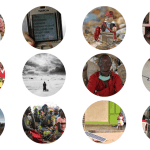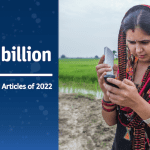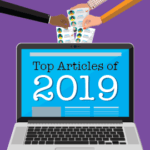What Was the Top NextBillion Post of 2018? Vote for Your Favorite
Note: Voting has concluded.
As 2018 comes to a close and we look back at the year’s top posts, some clear trends emerge, which can be summed up by the following questions:
- How can businesses both large and small leverage the astonishing power of emerging technologies – and the global connectivity they enable?
- What’s the best way to bring last-mile access to vital services to customers – and does improved access necessarily translate to better lives and livelihoods?
- Who really has the power when it comes to social impact-focused businesses and investments – and how can the sector ensure that these power dynamics don’t perpetuate the exclusion it’s striving to remedy?
In reading the posts below, it’s clear that the social sector is developing an increasingly willingness to challenge long-held assumptions – even when this leads to uncomfortable discussions and difficult course corrections. As we launch our seventh annual holiday contest, we encourage you read every post and vote for the one that influenced you the most.
You can vote up to once every six hours, via the voting app at the bottom of this page, and at the bottom of each individual post in the contest. CLICK HERE to jump to the voting app. The voting ends at 12:00 p.m. Eastern Standard Time (U.S.) on Jan. 3, and the winners will be announced on Jan. 4.
Please share this list widely, and thank you for reading NextBillion. Our team wishes you a happy holiday season, and a joyous and prosperous new year!
January
The Superplatforms are Coming … And They Will Transform Financial Inclusion
With their big brands, big budgets and big data, superplatforms like Google, Amazon, Facebook and Alibaba already know more about most banks’ customers than the banks themselves. As these internet giants make increasing inroads into financial services, what are the implications for low-income customers – and their existing providers? David Porteous of BFA and Olga Morawcynski of MasterCard Foundation explore how these platforms are reshaping the face of financial inclusion around the world.
February
Inclusive Innovation: How Two Mobile Technology Startups are Changing the Game in Microfinance
Securing a bank loan is an onerous task for anyone. But for the 2.5 billion unbanked people worldwide, the obstacles can seem insurmountable. And microfinance and village savings groups both have significant limitations, particularly for people without a credit history. June Sugiyama of Vodafone Americas Foundation explains how two winners of the foundation’s annual Wireless Innovation Project competition are overcoming these limitations through mobile technology.
March
As Impact Investors We Often Miss One Thing: Who Has the Power?
Impact investors are rightly focused on the social impact of the businesses they invest in. But they often overlook a fundamental question: How does the enterprise localize power? Galen Welsch, co-founder of Jibu, explores why the need to empower local markets should be at the core of social business and investing decisions.
April
Serving Smallholder Farmers in the Digital Age: Why it Requires Treating Data Like an Asset
As mobile technology becomes nearly ubiquitous, the next wave of users is expected to come from rural regions, where smallholder farmers produce the majority of the food yet often live in poverty. In these areas, data-driven agriculture is already creating a new economy – one in which data itself is the currency that can help lift farmers out of poverty. Bobbi Gray and Ellen Galdava discuss a Grameen Foundation paper, supported by USAID and FHI 360, on this quickly shifting dynamic.
May
Does financial inclusion really lead to financial health? The industry has largely been operating under the assumption that the answer is “yes” – but a Gallup survey of more than 15,000 people in 10 very different countries revealed a more complex picture. Sonja Kelly and Evelyn Stark explore the results of this “unprecedented look at personal finance and how people perceive their situation,” in a discussion that raises vital questions about the future direction of financial inclusion.
June
How Western Definitions Perpetuate Ethnocentric Bias – Even Among the Social Impact Crowd
You’d think that ethnocentrism – judging another culture by the standards or values of one’s own – would be relatively rare in the global, cosmopolitan social impact sector. In fact, says KadAfrica founder Rebecca Kaduru, it’s alive and well, as social entrepreneurs must often adapt to ethnocentric definitions to secure the funding necessary to grow their enterprises. She explores why this dynamic has to change.
July
Early-stage social venture accelerators are growing at a rapid pace in emerging markets, and they receive widespread acclaim – driven in part by positive results from research conducted by the Global Accelerator Learning Initiative (GALI). But South Africa-based investor Nicky Khaki cautions that, while accelerators can certainly have value, their benefits to participating companies may not be as clear cut as GALI’s data suggests. He explores why the studies may be exaggerating accelerators’ impact – and how they could do better.
August
The Vanishing American Dream: The Long Road to Financial Stability
The American economy is growing. Unemployment is down, incomes are inching up and the days of the Great Recession are but a distant memory… except for one thing: A shocking 57 percent of the country—approximately 138 million Americans—are struggling to make ends meet. Jennifer Tescher of the Center for Financial Services Innovation and Tilman Ehrbeck of Omidyar Network say the time to address this crisis is now. They share some promising innovations – and a new research tool – that could help.
September
The Trouble with ‘Free’: Why Treating the Poor as Customers Works Better than Charity
Lack of access to safe water is a leading cause of illness in developing countries. Yet for years, Guatemalan entrepreneur Philip Wilson’s family foundation worked to distribute free water filters across the countryside, only to see recipients repurpose them as flower pots and garbage cans. After going into the field to meet real families that were living with unsafe water, he came up with a better approach: a business model that treats the rural poor as consumers of products rather than objects of charity. He explores the reasons this model is working, and the challenges it has faced.
October
Homegrown, African-Owned: A New Approach to Building Africa’s Off-Grid Energy Industry
How can Africa achieve universal access to electricity – and what role should business and investing play? These questions remain controversial, as investors flood the off-grid solar space, while a small number of enterprises struggle to use that capital to expand beyond their core markets. According to Dan Murphy at Catalyst Off-Grid Advisors and Andreas Zeller at Open Capital Advisors, there’s a critical “missing link” where the industry should focus to reach the region’s 120 million underserved households. And there are thousands of African entrepreneurs who can lead the way – with the right kind of support from investors.
November
Many last-mile customers can’t afford clean energy products without financial solutions to help pay for them. Energy enterprises often meet this need in two different ways: by partnering with microfinance institutions (MFIs) to provide loans to customers, or by offering pay-as-you-go (PayGo) financing options. The United Nations Capital Development Fund’s CleanStart program has supported energy providers using both of these models, and Teresa Le, an energy finance consultant at the program, explores their relative merits and challenges.
December
What happens when a movement that aims to correct a global power imbalance develops an imbalance of its own? That’s the question facing renewable energy, says Solar Sister co-founder Neha Misra – a sector dominated by “largely white, often male, founder companies with Western expatriate leadership,” in which organizations with a social focus are sidelined by investors seeking quick profits. Misra discusses these and other uncomfortable truths – and why the movement must address them.
VOTING HAS CONCLUDED
- Categories
- Agriculture, Energy, Finance, Investing, Social Enterprise, Technology



